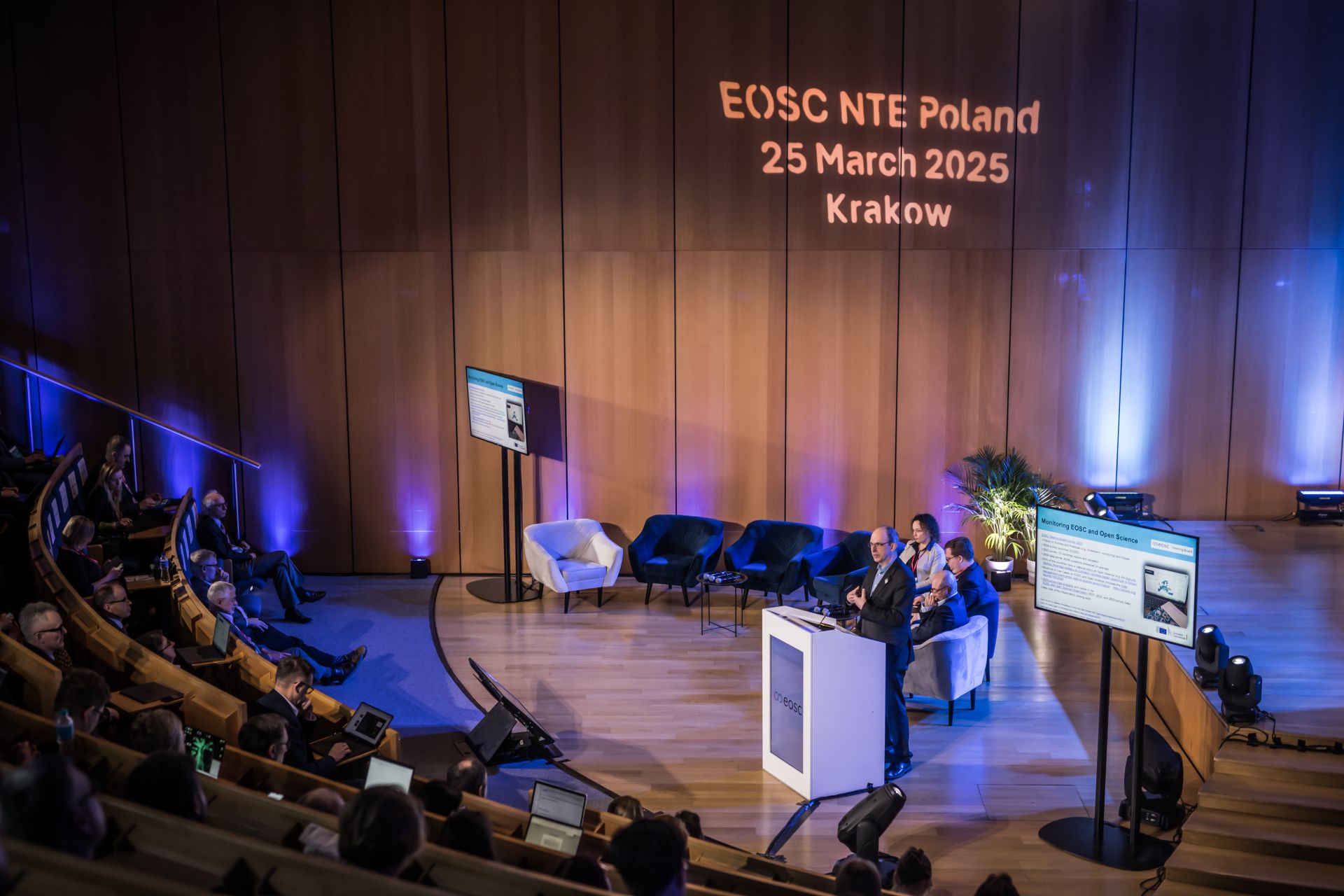 Last March, three strategic events shaping the future of the European Open Science Cloud were held in Krakow. The meeting of the EOSC Steering Board and the EOSC European Tripartite Event (EOSC Tripartite Governance meeting) were held on 24 and 25 May, respectively, under the auspices of the Polish Presidency of the Council of the European Union. Among the participants were experts of the EOSC Partnership, the European Comision and the EOSC Association, representing 42 Member States and countries associated to Horizon Europe. They met to discuss the most pressing issues related to the release of research data and digital resources in Europe, and measures to reach a consensus on the operation and sustainability of EOSC post-2027. On 25 March, the third EOSC National Tripartite Event Poland 2025 (NTE Poland 2025) was held, with the participation of 24 experts representing 14 research institutions, 4 research funding agencies and 6 research infrastructures.
Last March, three strategic events shaping the future of the European Open Science Cloud were held in Krakow. The meeting of the EOSC Steering Board and the EOSC European Tripartite Event (EOSC Tripartite Governance meeting) were held on 24 and 25 May, respectively, under the auspices of the Polish Presidency of the Council of the European Union. Among the participants were experts of the EOSC Partnership, the European Comision and the EOSC Association, representing 42 Member States and countries associated to Horizon Europe. They met to discuss the most pressing issues related to the release of research data and digital resources in Europe, and measures to reach a consensus on the operation and sustainability of EOSC post-2027. On 25 March, the third EOSC National Tripartite Event Poland 2025 (NTE Poland 2025) was held, with the participation of 24 experts representing 14 research institutions, 4 research funding agencies and 6 research infrastructures.
EOSC Steering Board’s Opinion Paper on the Tenth EU Framework Programme for Research and Innovation (FP10)
At a meeting on 24 March, the EOSC Steering Board enhanced the importance of EOSC as a cornerstone of research and innovation on the Single European Market. In the opinion paper “The European Open Science Cloud As A Cornerstone Of A “Fifth Freedom” In Research And Innovation,” the Board refers to the impact of EOSC on innovation, economic growth and enhancement of Europe’s competitiveness. The opinion paper lays down the recommendations for the development and implementation of EOSC under the Tenth Framework Programme.
EOSC as a Key Player for European Research, Competitiveness and Innovation
On 25 March, at the European Tripartite Event (ETE), the Tripartite Governance discussed an accessible narrative on EOSC, aimed to support policymakers and stakeholders in contextualising the role of EOSC within the European and national agendas, including the current strategies, policies and initiatives.
The document “Why EOSC is Pivotal to European Competitiveness” highlights the central role of EOSC in Europe’s research and innovation strategy, contributing to key priorities, such as enhancing capacity for innovation, research productivity, and scientific and technological leadership, digital and data sovereignty, and research security. It was emphasised that by fostering a collaborative, secure, efficient and trusted research environment, EOSC drives breakthrough innovation, while advancing the Open Science movement.
The EOSC Federation Handbook presented at the ETE in Krakow, is a key document for organisations interested in joining the Federation. The handbook contains information on the architecture, governance and operations of the Federation. It was drafted by over 40 volunteers representing the EOSC community which makes it a complex and representative source of knowledge for future Nods and service providers.
EOSC National Tripartite Event Poland 2025 in Krakow
EOSC National Tripartite Event Poland 2025 (NTE Poland 2025) was the third open science event in March. It was opened by Prof. Krzysztof Jóźwiak, NCN Director and Michał Goszczyński, Deputy Director of the Department of Innovation and Development at the Ministry of Science and Higher Education. They both emphasised EOSC’s strategic importance for an increased innovation, competitiveness and effectiveness of Polish science. The success of the Polish scientific community was addressed, i.e. admission of the EOSC-PL* National Node [supported by the National Science (NCN), Interdisciplinary Centre for Mathematical and Computational Modelling, University of Warsaw (ICM UW), Gdańsk University of Technology and PLGrid Consortium, comprising ACK Cyfronet AGH (representative), ICM UW, Poznan Supercomputing and Networking Centre (PCSS), CI TASK, Wrocławskie Centre for Networking and Supercomputing (WCSS) and the National Centre for Nuclear Research (NCBJ)] to the group of 13 organisations composing the EOSC Federation.
The representatives of the EOSC Tripartite Governance laid down the priorities for the EOSC Federation, emphasising the need for more transparency and use of the EOSC EU Nod and increased involvement in the federal structures. The need for EOSC’s stable post-2027 modus operandi was also called for, and alignment with initiatives like EuroHPC and European Data Spaces.
Panel sessions were held to discuss national initiatives to support EOSC, such as measures to create trusted environment to collect data on Polish science and funding opportunities for research infrastructure development under OPI PIB’s calls for proposals. The panel discussions addressed challenges in the field of domain data, underlining its heterogeneity, e.g. restrictions to the CERN data, as opposed to the astrophysical data, and technological, legal and social restrictions to medical data, including public trust issues. At the closing session, the practical aspects of interoperability were discussed, as well as sustainability of solutions, implementation of FAIR principles, and use of knowledge graphs. The meeting agenda is available here.
It is worth mentioning that the events took place at a pivotal phase of development of the future EOSC Federation, a system to enable transnational distribution of digital scientific resources. The meetings pinpointed past achievements, current challenges and the importance of EOSC for the future of European research, competitiveness and innovation.
More information:
